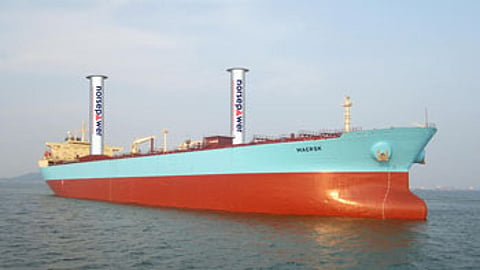

Norsepower Oy, Maersk Tankers, the Energy Technologies Institute (ETI), and Shell Shipping and Maritime will install and trial Flettner rotor sails onboard a Maersk Tankers-owned vessel.The project will be the first installation of wind-powered energy technology on a product tanker vessel, and will provide insights into fuel savings and operational experience.
The rotor sails will be fitted during the first half of 2018, before undergoing testing and data analysis at sea until the end of 2019. Maersk Tankers will supply a 109,647DWT Long Range 2 (LR2) product tanker which will be retrofitted with two 30-metre-tall by 5.0-metre diameter Norsepower Rotor Sails. Combined, these are expected to reduce average fuel consumption on typical global shipping routes by seven to 10 per cent.
The project is majority funded by the UK's Energy Technologies Institute (ETI) with contributions from Maersk Tankers and Norsepower. Shell will act as project coordinator, and provide operational and terminal/port consultancy to the project team, while Maersk Tankers will provide technical and operational insight.
"Flettner rotors have the potential to reduce ship fuel consumption substantially, especially on tankers and dry bulk carriers," commented Andrew Scott, Programme Manager HDV marine and offshore renewable energy, the Energy Technologies Institute. "It is one of the few fuel saving technologies that could offer double digit percentage improvements. To date, there has been insufficient full scale demonstration on a suitable ocean going marine vessel to prove the technology benefits and operational impact. Demonstrating the technology in this project will make it more attractive to shipping companies and investors, and could play a significant role in reducing the fuel costs and improving the environmental impact of shipping in the future."
The Norsepower Rotor Sail Solution is a modernised version of the Flettner rotor – a spinning cylinder that uses the Magnus effect to harness wind power to propel a ship. Each Rotor Sail is made using the latest intelligent lightweight composite sandwich materials, and offers a simple yet robust high-tech solution. When wind conditions are favourable, the main engines can be throttled back, providing a net fuel cost and emission savings, while not impacting scheduling. Independent experts will analyse the data gathered from the project before publishing technical and operational insights, and performance studies.
